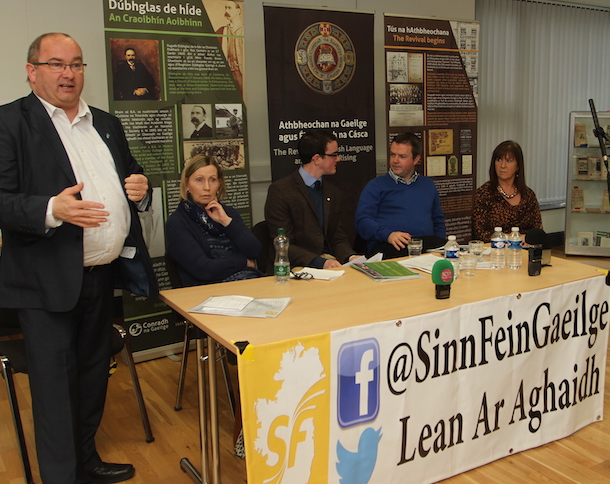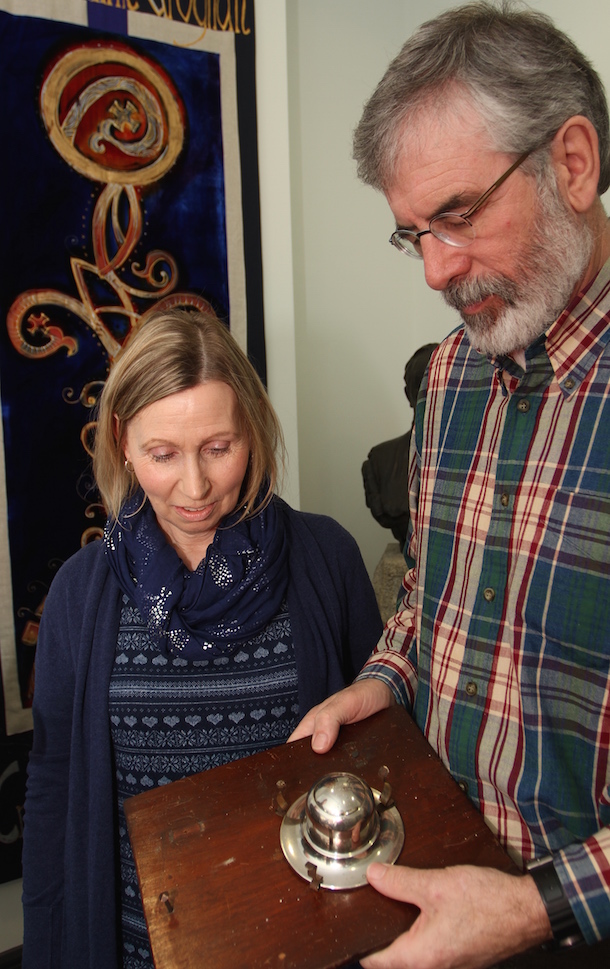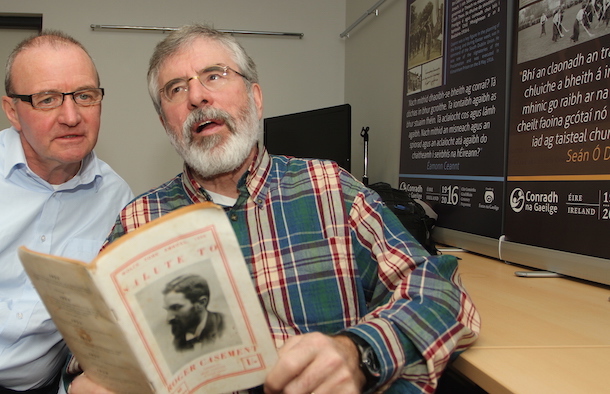27 November 2015
Irish language is key to developing an agreed, multicultural Ireland

● Senator Trevor Ó Clochartaigh, Linda Ervine from the East Belfast Mission, Dr Pádraig Ó Tiarnaigh of Conradh na Gaeilge, Dr Malachy O'Neill from the University of Ulster and West Belfast MLA Rosie McCorley
‘SLÓGADH SHINN FÉIN 2015’ took place last weekend. It was a great event and well attended.
The first session of the day was a panel discussion with Trevor Ó Clochartaigh, Linda Ervine, Pádraig Ó Tiarnaigh, and Malachy Ó Néill. They provided diverse contributions on political, legislative, cross-community, campaign and educational issues facing the promotion of the Irish language today.
Later, fascinating presentations were delivered by Aengus Ó Snodaigh TD on An Ghaeilge agus 1916, and by Neil Comer on Placenames.
Young musicians, dancers and singers from Ceoltóirí Shliabh gCuilinn provided entertainment and added to the lively atmosphere.
Several things stood out during this Slógadh.
A significant number of young people attended.
Bilingualism was the natural order of the day. At times I forgot whether I was speaking in, or listening to, either Irish or English!
This Slógadh contained signposts for the future.
Linda Ervine’s contribution was compelling. She spoke as a unionist who is also a dedicated exponent of Irish. At one stage she referred to those in her own section of our community who are learning the language:
“We are Protestants, unionists, loyalists, or none of those, but we have a right to learn our language and to learn and play our music.”

● Gerry Adams and Linda Ervine examine an ink well used by Pádraig Pearse when he stayed in the Cooley Mountains around 1906
An Ghaeilge, the Irish language, belongs to everybody and threatens no one.
Irish society, both North and South, is becoming increasingly multicultural.
There is no contradiction in unionists seeking to learn or speak Irish, or for republicans to be interested in Orange culture and traditions.
Our society should reflect the sum of its individual parts. It is not homogeneous. The world is a global village. The make-up of our society will continue to evolve and we need to become comfortable in embracing that shared diversity.
All cultural expressions and identities should co-exist and expect to be respected. That means entrenching and mainstreaming equality and demonstrating parity of esteem for the Gaelic, Orange and other traditions.
A mature, inclusive and far-seeing national conversation is required to begin reimagining and agreeing a better Ireland.
An agreed Ireland has to celebrate the political and cultural diversity of all citizens and that should be within a new, inclusive and representative constitutional framework.
The British and unionist identities should be accommodated within a future agreed, united Ireland.
● Gerry Adams reads an extract with Jim Gibney from a booklet in praise of Roger Casement
A recurring theme during an Slógadh was “eochar an teanga” – that is conceiving of the language as a key to unlock barriers and act as a catalyst for wider transformation in society.
How we foster and promote Irish in educational, community and legislative terms today will have a big influence on the degree to which that will happen in the future.
Already an Ghaeilge has shown its potential as resource for helping to develop reconciliation.
How we view and treat the language and the status conferred upon it by the states, North and South, will be a benchmark of actual commitment to legislate and commit support for a multicultural society going forward in Ireland. It will also ensure respect for ethnic and linguistic diversity.
Every day in the Six Counties, 5,000 children are educated through the medium of Irish; 20,000 people have signed up to the Líofa campaign.
Some parts of the North are mini Gaeltachtaí, such as west Belfast and An Carn Tóchair in County Derry. Many others have effectively become Breac-Ghaeltachtaí (mixed English and Irish-speaking areas). Places like Hightown and Crumlin in County Antrim are emerging vibrant Irish-language hubs.
All of this growth makes the case for legislation and Acht na Gaeilge, to provide proper support for language speakers and learners in the North.
The Stormont House Agreement Implementation Plan must now be maximised as a ‘Fresh Start’ for the future of the Irish language on the basis of equality and mutual respect.
But there is also a need for increased co-operation and more imaginative campaigning among Irish language, educational and cultural sectors and organisations, on an increasing cross-community basis in the North, so as to secure the future of the language, in the South and the North.
Sinn Féin can continue to play its part by continuing to garner support for an Ghaeilge in the political institutions – in Europe, Leinster House, the Assembly, North/South Ministerial Council, cross-Border bodies, and within local councils. However, Sinn Féin also needs to lead by example through a deeper and proactive commitment in Gaelicising the party at all levels.
Máirtín Ó Cadhain, the renowned author, cultural and political activist, famously tied the revival of the language to the transformation of Irish society when he said:
“Is í an Ghaeilge athghabháil na hÉireann, agus is í athghabháil na hÉireann slánú na Gaeilge.”
The ongoing language revival has a seminal role to play in the transformation of Irish society by encouraging bilingualism as a resource for reconciliation and by promoting respect for difference.
Increased popular support for and participation in the Irish language will be an important key to designing the template of an agreed, multicultural Ireland.
Follow us on Facebook
An Phoblacht on Twitter
Uncomfortable Conversations

An initiative for dialogue
for reconciliation
— — — — — — —
Contributions from key figures in the churches, academia and wider civic society as well as senior republican figures






